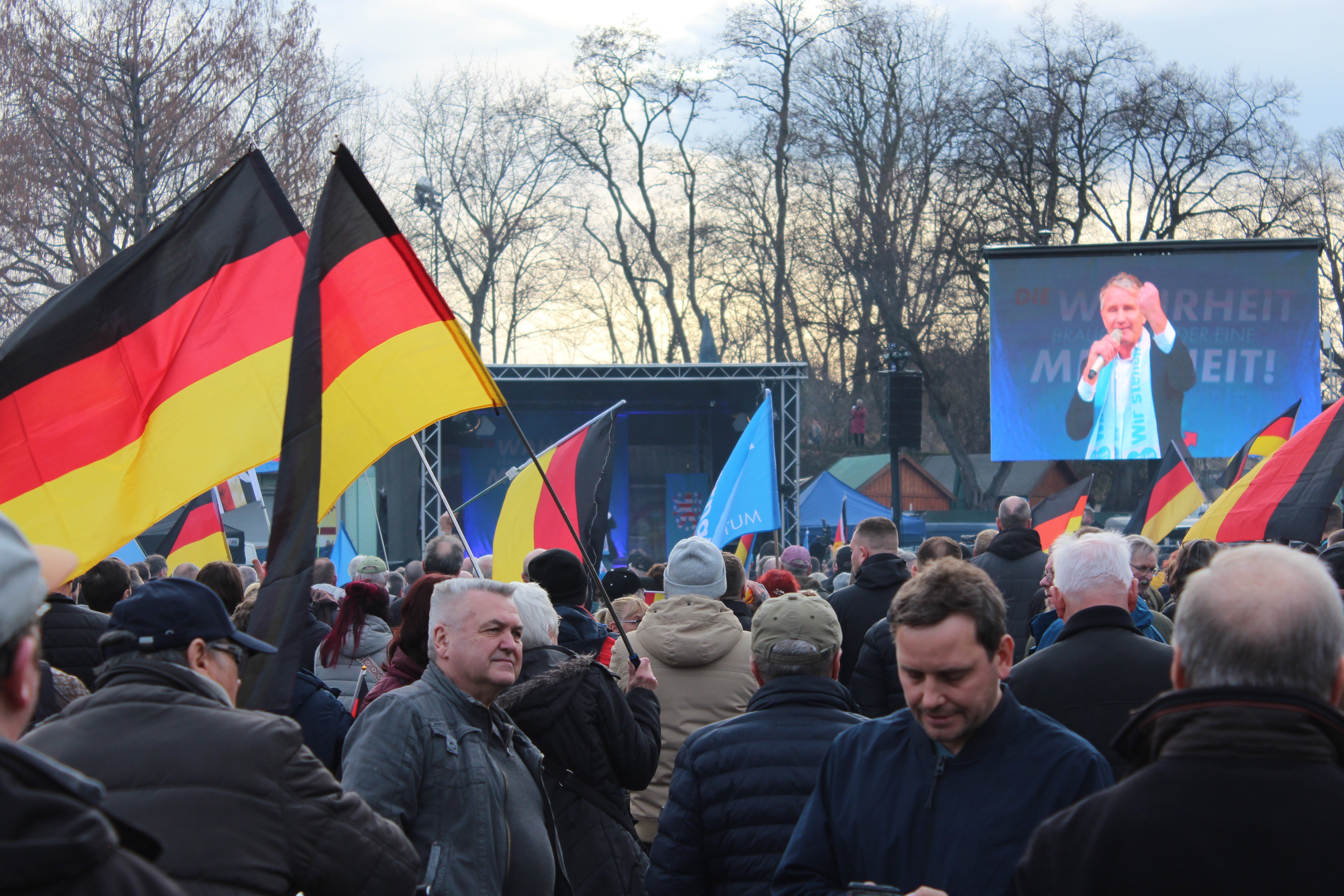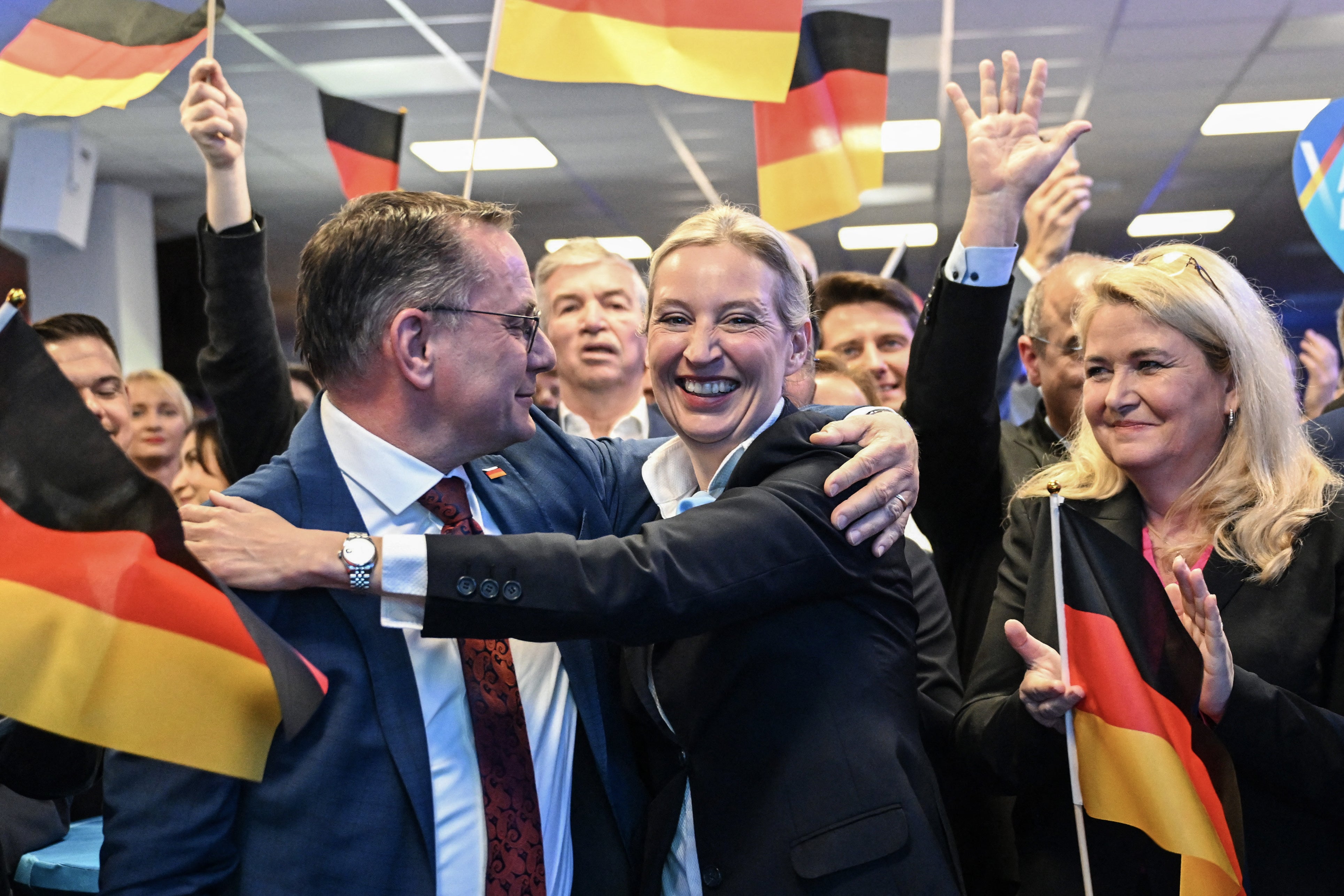Decades after the unification of Germany, the rise of extremist parties has divided the country once again, leaving the left-leaning capital surrounded by a sea of far-right supporters.
Alternative for Germany (AfD), a far-right party that has called for the “remigration” of millions of asylum seekers and advocates reopening ties with Vladimir Putin’s Russia, came second in the national vote on Sunday, winning 20.8 per cent of the vote. The centre-right Christian Democratic Union (CDU), which recently courted controversy for using AfD votes to push a proposal through the Bundestag on tougher migration policy, came first with 28.6 per cent.
The lion’s share of AfD’s votes, however, came from eastern Germany, where they won a huge majority of the states, losing out only in Leipzig and Berlin.
By contrast, in the west they won just two states: Gelsenkirchen near Dusseldorf, and Kaiserslautern towards the border with France, both by a thin margin over the CDU. The CDU nonetheless won a large share of the rest of the western states.
The country is now one of two halves: the blue of AfD in the east and the black of the CDU in the west. The division is strikingly similar to the picture in the post-war years of East and West Germany. The rise of AfD, analysts say, comes down to a perception in the eastern half that reunification failed to bring about economic prosperity.
In the capital, Berlin, deep within this sea of blue, residents say they are “devastated” by the result. A 28-year-old woman called Lou, from central Berlin, says she is “anxious” about the rise of AfD, adding that their triumph has come at the expense of her friends.
“I’m a white person, so it’s fine for me,” she says, suggesting that the AfD base is racist. “But it’s been bad for my friends. They feel really afraid. I feel that, too.”
Armin, 26, and Bora, 44, speaking from near Checkpoint Charlie, say AfD and its voters are “not smart people”, and express frustration that its supporters now surround them. Jivee, 25, who moved to Berlin from Ireland during the coronavirus pandemic, says he feels less safe because he is of Asian heritage, though he adds that he feels at home in the capital.
At a rally in the central-eastern state of Thuringia on Saturday, where AfD would secure its most significant victory on Sunday, winning 38.6 per cent – twice the share of the second-place CDU – locals speak of a different fear.
Doris, 61, says she has lived her whole life in Erfurt, the capital of Thuringia, where the rally is being held, but now she is too scared to go into the city at certain times.

“I don’t go into the city in the dark alone any more,” she says. “There are so many foreign people. And they have knives, weapons. The police often are there and just look on.”
She cites three terror attacks in the last three months – in the eastern city of Magdeburg in December, the southern city of Aschaffenburg in January, and Munich in February, all of which were committed by people not born in Germany – as evidence of the reality of the threat. She makes no mention of crimes committed by German-born criminals.
She says she was proud to vote for the Thuringia branch of AfD, despite it having been designated as extremist in 2021 for xenophobia.
Back in Berlin, Lou points to the rise of the far-left Die Linke as a saving grace.
Die Linke, which translates to The Left, benefited from an unexpected show of support on Sunday, defying expectations to achieve 8.8 per cent of the vote, up from 4.9 per cent in the 2021 election.
A few weeks ago, it was unclear whether the party would even reach the 5 per cent threshold needed to enter the Bundestag.
In Berlin, it emerged victorious with 21.8 per cent, ahead of the CDU on 21.3 per cent and AfD in third on 15.2 per cent. Many of the AfD votes came from the eastern constituency of Marzahn-Hellersdorf, where the party won by just 0.3 per cent over the CDU. It’s the first time in its 12-year history that AfD has won in a Berlin constituency.
Die Linke followed in the footsteps of AfD by investing heavily in social media to attract the young and previous non-voters. Responding to the push for tougher migration and the rise of the anti-migrant AfD, the party also advocated opening borders completely for uninvited migrants and refugees.
It won a quarter of votes among 18- to 25-year-olds, ahead of AfD on 21 per cent.

Both AfD and Die Linke pulled hundreds of thousands of votes from the more centrist parties, according to projections.
AfD gained 1 million voters from the CDU, 890,000 from the economically liberal Free Democratic Party and 720,000 from the centre-left Social Democratic Party (SPD).
At a press conference on Monday from the CDU headquarters in Berlin, the future chancellor Friedrich Merz said he was “very concerned about what’s happening in the east”.
He said colleagues in the eastern states feared western Germany was only a few years behind, and that if they did not fix the issues facing the country, which include migration, the economy and the job market, then AfD could gain further ground.
It is paramount to “take away the fertile ground from underneath the feet” of AfD, he added.
Die Linke, meanwhile, gained 560,000 votes from the SPD and 700,000 from the left-wing Greens. It lost 350,00 to the far-left Sahra Wagenknecht Alliance (BSW).
Armin and Bora were two of those who shifted to the BSW. Their reasons for doing so were markedly similar to that of Doris in her decision to vote for AfD: they want an end to the war in Ukraine. Both parties had suggested that talks were necessary, and that German support was not.
“All the other parties said to give more money to Ukraine, and weapons,” says Bora. “But weapons are not the answer. Sit down at the table and talk about it, that is the answer.”







